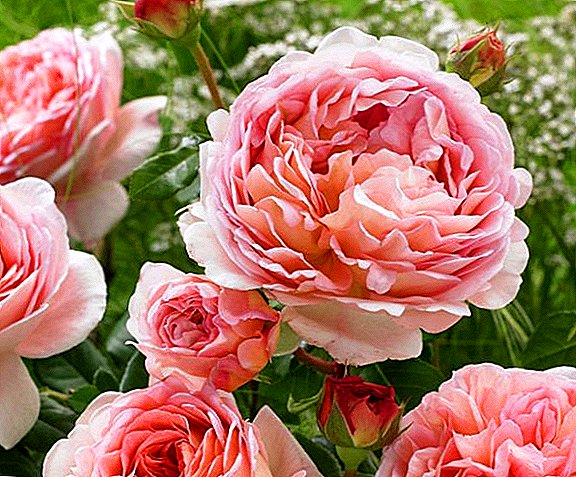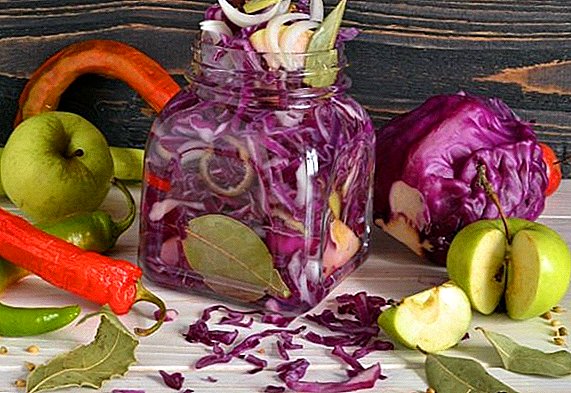
Gardenia is a tropical shrub from the genus Marenovs. The evergreen attracts with the beauty of large white or yellow flowers and sweet aroma. The decorative component is valued by flower growers, and the chemical composition of the plant was adopted by physicians and cosmetologists.
In the literature of ancient China, the properties of gardenia were attributed to magical properties. Their scent made you forget about problems, gave peace and bliss. Modern technologies have made the tale a reality, the essential oil of gardenia has the ability to control a person’s mood.
Description and origin
Evergreen shrub with dense glossy leaves of rich green color grows in tropical and subtropical forests of China, Japan and South Africa. Familiarity with him people are obliged to the American botanist Alexander Garden.
 In the open ground, a representative of the family of marenovy will grow to 2.5 m. The genus Gardenia has about 250 species (learn about the types and popular varieties of gardenia, as well as see photos of the plant, here). Among them are indoor plants. Heat-loving shrub in temperate latitudes grown in pots. It is noticeably smaller than tropical species and reaches 0.5-1 m.
In the open ground, a representative of the family of marenovy will grow to 2.5 m. The genus Gardenia has about 250 species (learn about the types and popular varieties of gardenia, as well as see photos of the plant, here). Among them are indoor plants. Heat-loving shrub in temperate latitudes grown in pots. It is noticeably smaller than tropical species and reaches 0.5-1 m.
Gardenia jasminoid (jasmine) - the most common decorative appearance. He is whimsical in content, requires maintaining a special microclimate. The plant needs constant high temperature + 22-25 ° C and humidity.
He needs good lighting, but not in direct sunlight. The soil should be keeled - pH 4.5-5.0. Suitable special soil for azaleas. The shrub needs frequent watering with warm soft water.
More often they are located singly, but some varieties form inflorescences. Between June and October, the room is filled with the sweet aroma of jasmine. Delicate flowers can not stand the cold, dry and drafts. They can not be rearranged from the usual place, and spraying is better to replace wiping the leaves.
Chemical composition
Gardenia is actively used in medicine and cosmetology.This contributed to the chemical composition of the plant. Glycosides (Gardenozide, Geniposide) contained in fruits and leaves have anti-inflammatory and antipyretic properties.
Essential oils from flowers are the basis of perfumes and cosmetics. The plant contains: benzyl acetate, lina-rilagetat, methylanilide.
Is it possible to keep the plant at home?
When buying a new houseplant, flower growers do not ask themselves: is gardenia poisonous or not? Among ornamental plants there are species with high toxicity: adenium, oleander, dieffenbachia, all varieties of lilies and others.
 Gardenia refers to indoor plants with low toxicity. It does not threaten the lives of people or animals, even if juice enters the stomach. But eating raw leaves and fruits of the bush is not worth it, they cause diarrhea, vomiting and weakness. After pruning or pinching shoots, wash your hands with soap and water to get rid of plant sap.
Gardenia refers to indoor plants with low toxicity. It does not threaten the lives of people or animals, even if juice enters the stomach. But eating raw leaves and fruits of the bush is not worth it, they cause diarrhea, vomiting and weakness. After pruning or pinching shoots, wash your hands with soap and water to get rid of plant sap.
Gardenia jasminoid helps to create a favorable atmosphere in the house. It decorates the interior, and during the flowering period it smells like a jasmine. Delicate aroma helps to improve mood, people get depressed, their well-being improves.
Flower growers noticed that during this period the number of quarrels in the family decreases. Ornamental shrubs can be put in the office (if possible, provide proper care), in the living room, where all family members gather (we told about the rules of garden care at home here).
Note! Suitable plant for the bedroom, if the windows of the room overlook the west or south-west side, without the fear of putting it on the window sill.
- How to propagate flower cuttings?
- How to grow from seed?
- How to transplant?
- Why blacken, turn yellow and fall leaves?
- What are the reasons for the lack of flowering?
- What is needed primer?
- Common diseases of gardenia and methods of dealing with them.
The use of ornamental shrubs
In folk medicine, medicinal properties of gardenia have long been used. Her ability to heal wounds, reduce pressure, improve the activity of the gallbladder is noticed. In Chinese medicine, the fruits and roots of the shrub are used to create a cure for many diseases.
Broths from its parts are used as anti-inflammatory, antipyretic and hemostatic agents. They are included in the recipes of compositions for hepatitis, stomatitis, mastitis, herpes, tonsillitis, jaundice.
 Extract of gardenia reduces the amount of bilirubin in the blood. A decoction of the roots has anthelmintic action.
Extract of gardenia reduces the amount of bilirubin in the blood. A decoction of the roots has anthelmintic action.
Gardenia jasmine petals are harvested, dried and used as a natural tea flavor. The fruits of the shrub are used in getting rid of kidney diseases (nephritis), liver, and lungs. Equally effective external use. From crushed fruits make compresses for wounds, bruises, burns.
After their application, the pain disappears, swelling subsides. In addition to medicine, the plant has found wide application in cosmetology and the perfume industry.
Stem cell extract
Investigating gardenia stem cells, scientists have discovered ferulic acid, which has significant antioxidant properties. For cosmetology, it is an opportunity to create effective tools to combat skin aging.
Plant cells contribute to the elimination of toxins, accelerate the production of new collagen. As a result, the skin is smoothed, elasticity increases, color improves.
The extract is extracted in early spring when the plant begins active growth. Fresh buds, sprouts, roots - a material with the maximum energy potential. From it make the hood, preserving the whole intercellular substance.
When mass production resorted to biotechnological synthesis. Stem cells are grown from plant tissue of gardenia. The combination of technology and nature allows you to get a huge amount of raw materials without destroying shrub plantations.
IMPORTANT! Gardenia refers to plants containing a large number of amino acids, antioxidants and enzymes. The extract, isolated from its stem cells, affects immediately several causes of skin aging.
As part of cosmetics, it prevents the destruction of the structure of collagen, stimulates cell renewal. The extract is known for its effective effect on the hair. It strengthens, moisturizes and nourishes the hair, acting on their roots.
Essential oil
From the white fragrant flowers of gardenia jasminoid get an essential oil with a complex rich, sweet aroma. It is produced by synthesis from dried flowers. It is impossible to remove oil in an industrial way.
 Extraction is used to obtain valuable material. Dry raw materials are treated with organic solvents, getting concrete. To obtain the final product specifically diluted with alcohol. After sedimentation of impurities remains a yellow oily liquid with a sweet aroma.
Extraction is used to obtain valuable material. Dry raw materials are treated with organic solvents, getting concrete. To obtain the final product specifically diluted with alcohol. After sedimentation of impurities remains a yellow oily liquid with a sweet aroma.
The oil is used in high-class perfumes. It is successfully combined with the aroma of citrus, neroli, rose and ylang-ylang. The essential oil of gardenia is the basis of eastern perfumes.
It is found in the collections of Calvin Klein, Gucci, Paco Rabanne. The oil has several beneficial properties:
- Rejuvenation - activates the renewal of skin cells.
- Fortification - Amino acids nourish hair follicles, make hair strong and healthy.
- Anti inflammatory - used to heal minor wounds and burns.
- Toning - as part of the means of cellulite eliminates skin irregularities and stretch marks. It gives the body firmness and elasticity.
In breathing aroma helps to get rid of headaches, cramps, has a sedative effect. Adding a remedy to a bath will help avoid insomnia. Gardenia oil is included in many types of cosmetics:
- shampoo for hair strengthening;
- nutritious cream;
- body milk;
- intimate hygiene products.
Contraindications
Individual intolerance may be present with any herbal medicine. It is not suspected prior to first use. To essential oil must be treated with caution.
To eliminate the allergic reaction. It is necessary to put a drop on the crook of the elbow. If you experience unpleasant symptoms: dizziness, irritation on the skin, nausea, it is better to refuse to take drugs from gardenia.
It is not recommended to use essential oil in the second trimester of pregnancy. The use of decoctions of fruits and roots should occur under the supervision of a physician.
Exotic and capricious gardenia with proper care will be up to 7 years old to please with its beauty and soothe the sweet aroma. Tropical shrubs are a real find for modern cosmetology and perfumery.
Stem cells and plant oil help women maintain their attractiveness and sensuality. Medicinal properties of fruits and roots are successfully applied in traditional medicine.












